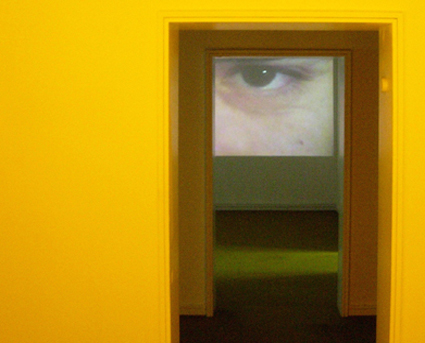The two for two art group (CY)
Reaction, 2003, time 2:05 sec
Concept
In 242’s work the body becomes the battleground where the private narrative, which proceeds it and the politics governing it, become inscribed on to its surface. For the Postmodern subject the body becomes essential for the construction of its identity. But the work brings forward the construction of a non-self-identity by visually manipulating the deconstructed and fragmented body. The viewer is no longer a voyeur which observes the body as a traditional whole figure of another, but the subject matter of the work becomes the suggestion of the body through which one’s humanness is best recognized: through one’s own body. As Terry Eagleton comments in his book ‘Illusions of Postmodernism’ (Blackwell, f.p. 1996), “...Bodies are ways of talking about human subjects without going all sloppily humanist... For all its carnivalesque cavortings, body talk is thus, among other more positive things, our latest form of repression; and the postmodern cult of pleasure... is a very solemn, high-toned affair indeed.” The dynamics, which proceed the new somatics are far more complicated since the body is not just a carrier of sexual pleasure, but it is also the vehicle with which the individual will communicate of what is “inside”. There is a haunting need that the interiority of feeling and thought be evident in the real world through the visual verification of us: our bodies. It is essential in our realization as human beings that this interiority which in Christian tradition is called the soul, be exteriorized or better be it: the body. Because as Wittegenstein once remarked “...the body was the best image we had of the soul.” Upon the body a whole new system of a somatic language is inscribed, aiming to interact who one is, not in terms of inside or outside (body outside, soul inside) but rather both at once; through the mechanics and the language of a body which has a ‘soul’ or rather is the soul. It is this new language, which liberates us and defines our humanness and consequently gives birth to the linguistic language. And as T. Eagleton comments “... Language is what emancipates us to abstract ourselves from the world (which includes for this purpose our bodies)... Language liberates us from the prison-house of our senses...”
Reaction, 2003, time 2:05 sec
Concept
In 242’s work the body becomes the battleground where the private narrative, which proceeds it and the politics governing it, become inscribed on to its surface. For the Postmodern subject the body becomes essential for the construction of its identity. But the work brings forward the construction of a non-self-identity by visually manipulating the deconstructed and fragmented body. The viewer is no longer a voyeur which observes the body as a traditional whole figure of another, but the subject matter of the work becomes the suggestion of the body through which one’s humanness is best recognized: through one’s own body. As Terry Eagleton comments in his book ‘Illusions of Postmodernism’ (Blackwell, f.p. 1996), “...Bodies are ways of talking about human subjects without going all sloppily humanist... For all its carnivalesque cavortings, body talk is thus, among other more positive things, our latest form of repression; and the postmodern cult of pleasure... is a very solemn, high-toned affair indeed.” The dynamics, which proceed the new somatics are far more complicated since the body is not just a carrier of sexual pleasure, but it is also the vehicle with which the individual will communicate of what is “inside”. There is a haunting need that the interiority of feeling and thought be evident in the real world through the visual verification of us: our bodies. It is essential in our realization as human beings that this interiority which in Christian tradition is called the soul, be exteriorized or better be it: the body. Because as Wittegenstein once remarked “...the body was the best image we had of the soul.” Upon the body a whole new system of a somatic language is inscribed, aiming to interact who one is, not in terms of inside or outside (body outside, soul inside) but rather both at once; through the mechanics and the language of a body which has a ‘soul’ or rather is the soul. It is this new language, which liberates us and defines our humanness and consequently gives birth to the linguistic language. And as T. Eagleton comments “... Language is what emancipates us to abstract ourselves from the world (which includes for this purpose our bodies)... Language liberates us from the prison-house of our senses...”
